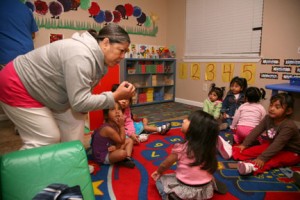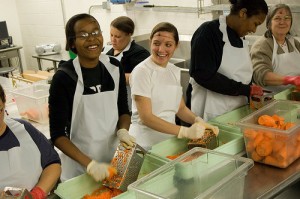“A new kind of cultural borderland”
While there are many migrant farmworkers in Adams County, the population of settled Mexican and Latino residents is growing. Community members in all fields have noticed the trend. Robert Morrill (2003), the former principal of a Gettysburg elementary school, noted that more Latino students than ever are enrolling and staying enrolled for the school year. Pastor Sadler cited a study that documented that the Latino population of the area is “blooming” despite the fact that the total population has decreased somewhat. The new Latino community developing in this unconventional venue is, as Davis, et al., (2009) say, “[creating] a new kind of cultural borderland” (p. xvii).
Many social service organizations have come to see the great need of this growing migrant and settled farmworker community, and more and more are offering services specifically for them. For example, Keystone Health, Wellspan Health, and Family First Health offer various health services to migrants, including a free clinic.
Pathstone offers job training programs to documented migrant farmworkers, as well as financial education, home buyer pre-purchase education and post-purchase counseling, and emergency food and shelter when possible. It also houses
the Rural Opportunities, Inc. Migrant Head Start/Child and Family Development Program of Adams County in the Field of Dreams Farm Worker Family Service Center. This program provides child care including education, training, disability, family literacy, nutritious meals and advocacy services for children up to five years old. The Lincoln Intermediate Unit Number 12 is a supplementary education program for children of migrant workers.
Friends of Farmworkers is a legal advocacy organization that fights for farmworker’s living and working conditions. All of these agencies have to proactively reach out to the migrant community and encourage them to take advantage of their services. As with social service providers in Dalton, Georgia, those in Adams County are still working to accommodate the growing need of the Latino population here (Davis, et al., 2009).
The Adams County Community Needs Assessment 2003-04 provides a detailed description of needs and social services.
Assessment of Food-Related Social Services
The social service paradox is a trend that has emerged in the body of research done on the U.S. Latino population, particularly migrant workers. Although many farm workers live in poverty, very few actually utilize the food assistance programs that they are either eligible for or have access to (Cason et al 2003; 3). Need more here- explain why.
Food-related social services were identified in Adams County. This was done in order to understand the status of food security and any barriers that might exist for the Latino population while also understanding what resources have been made available to address community needs. Interviews with employees at these organizations provided important information as to the background of the community they serve and the distinct manners in which the organization served the community. For this study three organizations were investigated, which were 1) Pathstone Corporation, 2) The Campus Kitchen of Gettysburg College and 3) The Lincoln Intermediate Unit #12, including the observation of a photography taught by a student, Marilyn Romero, from Dickinson College. Edit this- out of context. The Campus Kitchen at Gettysburg College is an example of the work being done by the non-profit organization The Campus Kitchens Project, located in Washington D.C. At Gettysburg, volunteers prepare and repackage good, unused food from the Dining Hall, local restaurants and caterers, and local farmers into “healthful, balanced meals that fill stomachs and bridge gaps between social groups.”
In this way, the Campus Kitchen helps reduce waste, bring meals to community members in need, and creates relationships with the Gettysburg community. Meal donations from the Campus Kitchen are currently focused on several groups in the community. These groups include seniors, migrant farmworker families, at-risk Latino families, and a healthy snacks program for after-school students, as well as their newest population: Latino students at ESL classes taught at the Lincoln Intermediate Unit #12, which they serve a weekly dinner for. The Campus Kitchen is an attempt at a long-term, sustainable solution to an issue that has implications for individuals in all parts of the community: seniors, women, men, and children.- Jane Luceno
Other institutions – namely Mexican food stores and restaurants – have popped up in the area as well. Lua’s Mexican Stores and Tania’s Mexican Restaurant are just a few of these businesses. Even the “Hispanic” food aisle at the Gettysburg GIANT supermarket, which has only existed since 1997, has greatly expanded (Snyder, 2003). Places like Lua’s are also important because they allow Latino workers to make international phone calls and send money orders back home. In fact, Latinos send home about $20 billion in remittances, a source of foreign exchange “second only to oil” (Barndt, 2008, p. 188). -Jane Luceno
Closing the Food Gap in Adams County: March 2009
Health and Nutrition of Hispanic Migrant and Seasonal Farm Workers: November 2004


Leave a Reply